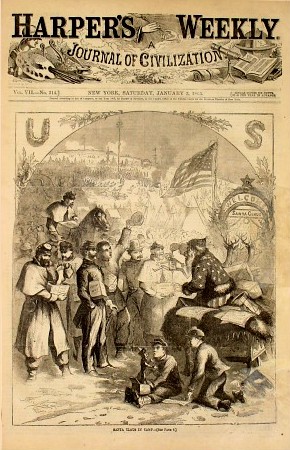
“A Christmas Furlough” by Thomas Nast, from the January 3, 1863 edition of Harper’s
‘Tis the season of “Peace on earth, good will to men.” And yet, the guns still blast through war-torn lands engulfed in genocide; they blast through concert halls, schoolyards, and churchyards, dousing sanctuaries with blood, while the newest “Cold War” percolates threats of mass destruction. “Peace on earth, good will to men,” is the song that heralds the birth of the Christ, but it also ushers in the flight to Egypt, the slaughter of the Holy Innocents, and ultimately, the crucifixion. Whatever the peace of Christmas is, it is not an end to earthly violence.
Like you, I wish it were.
Christmas peace is deeper than a lack of violence—though I have not yet learned to call what is deeper, “better.” This is the challenge Christmas presents to me—to all of us—because the peace of Christmas “surpasses all understanding” (Philippians 4:7). The peace of Christmas is simply the presence of faith.
“Christmas Bells”
Henry Wadsworth Longfellow
(1807-1882)
Written on Christmas Day, 1863,
after his son had been severely wounded in the Civil War
I HEARD the bells on Christmas Day
Their old, familiar carols play,
And wild and sweet
The words repeat
Of peace on earth, good-will to men!
And thought how, as the day had come,
The belfries of all Christendom
Had rolled along
The unbroken song
Of peace on earth, good-will to men!
Till ringing, singing on its way,
The world revolved from night to day,
A voice, a chime,
A chant sublime
Of peace on earth, good-will to men!
Then from each black, accursed mouth
The cannon thundered in the South,
And with the sound
The carols drowned
Of peace on earth, good-will to men!
It was as if an earthquake rent
The hearth-stones of a continent,
And made forlorn
The households born
Of peace on earth, good-will to men!
And in despair I bowed my head;
“There is no peace on earth,” I said;
“For hate is strong,
And mocks the song
Of peace on earth, good-will to men!”
Then pealed the bells more loud and deep:
“God is not dead, nor doth He sleep;
The Wrong shall fail,
The Right prevail,
With peace on earth, good-will to men.”
You can read the full story behind the poem here.
Karen Ullo is the author of two novels, Jennifer the Damned and Cinder Allia. She is also the managing editor of Dappled Things literary journal and a regular Meatless Friday chef for CatholicMom.com. She lives in Baton Rouge, LA with her husband and two young sons. Find out more at www.karenullo.com.

Recent Comments